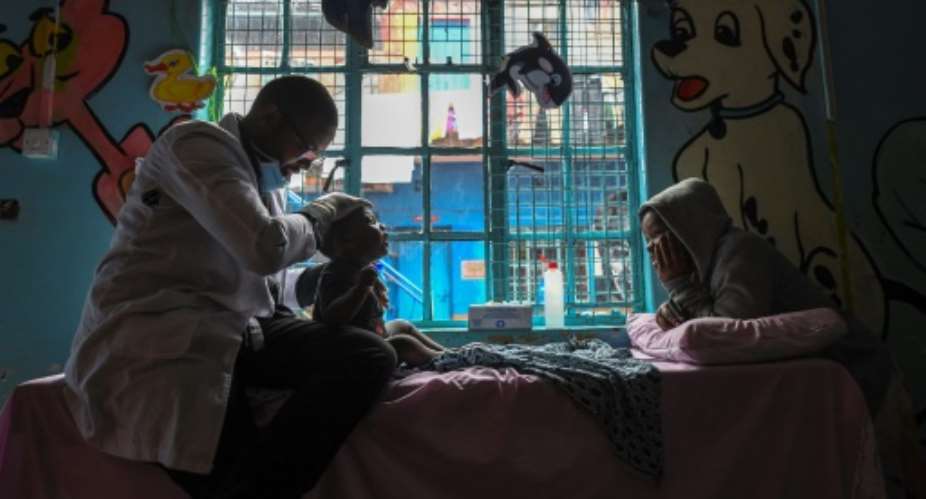For children born with disabilities in Kenya's Mathare informal settlement, life can be grim as they face stigma from their community and families and little in the way of support.
Elizabeth Waithera, 37, after witnessing the struggles faced by her special needs sister, decided to set up a centre offering free therapy for the disabled.
With its walls covered with bightly painted animals and cartoon characters like Winnie the Pooh and Scrooge McDuck, the small centre is a haven of joy for the children who come for therapy.
"Most of these youth and kids suffer discrimination and stigma, including from their parents," Waithera, a psychologist and social worker, told AFP.
 Many of the children with special needs suffer discrimination and stigma. By TONY KARUMBA (AFP)
Many of the children with special needs suffer discrimination and stigma. By TONY KARUMBA (AFP)
She employs physiotherapists and caregivers who help children with cerebral palsy, autism, visual or hearing impairment or mental health problems.
An occupational therapist comes in twice a week, his services donated by the ActionAid charity.
On days when the centre is not holding physiotherapy sessions the facility becomes "a specialised daycare for the children with challenges such as autism, blindness and deafness to allow the parents a break from the intensive schedule of caring for them," she said.
 The centre employs physiotherapists and caregivers who help children with cerebral palsy, autism, visual or hearing impairment or mental health problems. By TONY KARUMBA (AFP)
The centre employs physiotherapists and caregivers who help children with cerebral palsy, autism, visual or hearing impairment or mental health problems. By TONY KARUMBA (AFP)
This allows them to "engage in their usual income generating pursuits or just have some much needed rest."
"For children who are blind or deaf but (have) sufficient motor skills we start by offering basic vocational training like crocheting... as we hope to eventually upgrade" the youngsters to be able to operate sewing machines, Waithera said.
"Also in the near future we aspire to offer vocational training to the more mentally challenged kids suffering autism and other forms of developmental disabilities," she said.
The centre, whose services are free, relies on donations -- which have decreased because of the coronavirus pandemic.
 The facility relies on donations, which have decreased because of the coronavirus pandemic. By TONY KARUMBA (AFP)
The facility relies on donations, which have decreased because of the coronavirus pandemic. By TONY KARUMBA (AFP)
"It is a challenge doing it for free, bearing in mind I have staff that needs to be paid, food, diapers, premises... It's a big challenge because we depend on well-wishers, meaning this month can be good and next month not good," Waithera said.
"Ensuring that our physiotherapist is paid on time, monthly, is quite a challenge that has become even greater lately due to Covid.... that has seen support from well-wishers dwindle a little.
"He however has been very kind and continued to provide his services, on schedule, even when we've been unable to secure his salary for months at a time".





 Former Kotoko Player George Asare elected SRC President at PUG Law Faculty
Former Kotoko Player George Asare elected SRC President at PUG Law Faculty
 2024 elections: Consider ‘dumsor’ when casting your votes; NPP deserves less — P...
2024 elections: Consider ‘dumsor’ when casting your votes; NPP deserves less — P...
 You have no grounds to call Mahama incompetent; you’ve failed — Prof. Marfo blas...
You have no grounds to call Mahama incompetent; you’ve failed — Prof. Marfo blas...
 2024 elections: NPP creates better policies for people like us; we’ll vote for B...
2024 elections: NPP creates better policies for people like us; we’ll vote for B...
 Don’t exchange your life for wealth; a sparkle of fire can be your end — Gender ...
Don’t exchange your life for wealth; a sparkle of fire can be your end — Gender ...
 Ghana’s newly installed Poland train reportedly involved in accident while on a ...
Ghana’s newly installed Poland train reportedly involved in accident while on a ...
 Chieftaincy disputes: Government imposes 4pm to 7am curfew on Sampa township
Chieftaincy disputes: Government imposes 4pm to 7am curfew on Sampa township
 Franklin Cudjoe fumes at unaccountable wasteful executive living large at the ex...
Franklin Cudjoe fumes at unaccountable wasteful executive living large at the ex...
 I'll 'stoop too low' for votes; I'm never moved by your propaganda — Oquaye Jnr ...
I'll 'stoop too low' for votes; I'm never moved by your propaganda — Oquaye Jnr ...
 Kumasi Thermal Plant commissioning: I pray God opens the eyes of leaders who don...
Kumasi Thermal Plant commissioning: I pray God opens the eyes of leaders who don...
